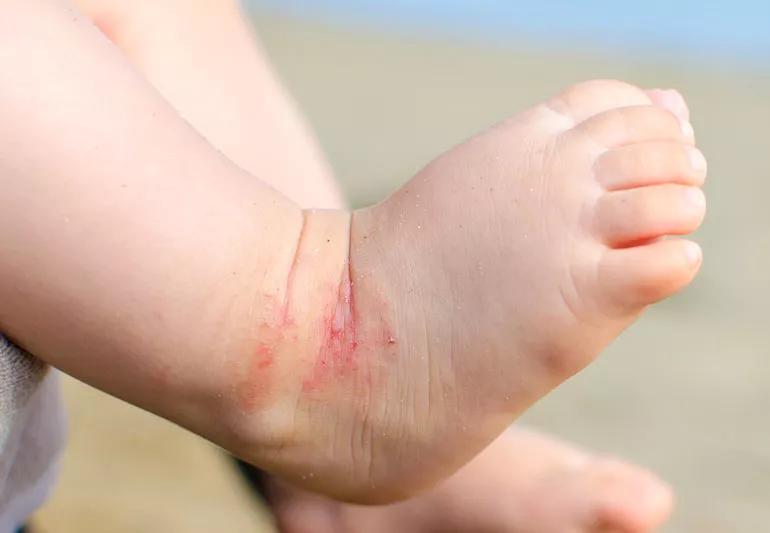Keeping their skin moisturized — and scratching at bay — is half the battle

Image content: This image is available to view online.
View image online (https://assets.clevelandclinic.org/transform/ab022ee8-700f-4e7d-a51b-3ec753833b47/baby-feet-with-Eczema-596089610-770x533-1_jpg)
Close up of a baby's foot that shows eczema irritated skin.
Nobody wants to see their kid itching and miserable — but a lot of us do, thanks to eczema. According to pediatric dermatologist Joan Tamburro, DO, up to 30% of children under age 2 can have atopic dermatitis, more commonly known as eczema.
Advertisement
Cleveland Clinic is a non-profit academic medical center. Advertising on our site helps support our mission. We do not endorse non-Cleveland Clinic products or services. Policy
Eczema is an inflammation of the skin that tends to run in families. It’s most common in those with a personal or family history of asthma, hay fever or other allergies.
Most children outgrow the condition, although flare-ups (flares) can recur throughout life. And dry, sensitive skin may always be a concern. We talked to Dr. Tamburro about the best way to treat your child’s eczema flares — and what you can do to help prevent them.
What exactly is eczema, anyway?
Eczema is an inflammatory disorder of the skin. When you have eczema, your top layer of skin — the skin barrier — is weakened. That allows allergens to penetrate into your skin, causing inflammation.
“Eczema can start as dry skin, but it’s more than dryness,” says Dr. Tamburro. “It often turns into a red, extremely itchy rash that can even ooze. Sometimes, scratching can cause the rash to bleed, crust and scale over.” The resulting areas of open skin can lead to skin infections.
Eczema can appear anywhere on the body, Dr. Tamburro says, but location often changes with age. It’s usually on the:
Advertisement
While dry skin can trigger flares, so can environmental factors, including:
“Some parents are aggressive at treating other health problems but disregard their child’s eczema, thinking skin problems are no big deal,” notes Dr. Tamburro. “When children are itchy every day of their life, it is a big deal. Kids suffer with it.”
Itching due to eczema can prevent children from sleeping well. It’s also highly distracting, which can make it hard to concentrate on learning during school or daycare.
There are many ways to treat eczema, from prescription medications and over-the-counter medications to creams and home remedies. Here are some tried-and-true methods to treat an eczema flare:
If your child’s skin isn’t responding well — or if their eczema is getting worse — it’s time for a trip to their pediatrician. Depending on the cause and severity of your kiddo’s rash, their doctor may prescribe:
While these treatments help, eczema prevention is equally important.
In addition to avoiding triggers, good skin care is the best way to prevent the dry, itchy skin that can provoke eczema flares. Dr. Tamburro recommends parents help children with eczema:
Advertisement
While it’s not curable, eczema can be managed, says Dr. Tamburro. And many children do outgrow the condition, or at least can go longer in-between flares.
Still, people who’ve had flares, even as infants, need to protect their skin for the rest of their lives.
The good news: If you talk to your little one about what you’re doing and why, all the time and energy you put into managing your child’s eczema will help them keep their skin healthy and clear as they get older.
Advertisement

Sign up for our Health Essentials emails for expert guidance on nutrition, fitness, sleep, skin care and more.
Learn more about our editorial process.
Advertisement
Gentle care, like moisturizing, washing and soft brushing, can help clear up cradle cap
Gripe water isn’t regulated by the FDA, and research doesn’t support its use
Jaundice that’s present at birth or lasts more than a week should be evaluated by a pediatrician
When tight neck muscles give your newborn a head tilt, these gentle exercises can go a long way
Crossed eyes in a newborn are fairly common, typically harmless and usually go away
Neonatal opioid withdrawal syndrome, or NOWS, can develop when a fetus is exposed to opioids, nonmedical drugs or even some prescription drugs during pregnancy
Most parents report an improvement in breastfeeding, but there’s a chance the procedure won’t solve the issue
All babies go through a perfectly normal peeling phase in the first couple weeks
Although it could be used as a moisturizer, this new trend is not recommended
Communicating clear limits helps protect your time, energy and emotional well-being
High cholesterol can be genetic, but testing and treatment can lower your heart disease risk